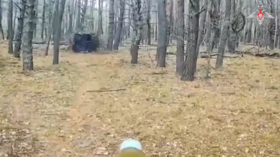Deployment of US missile defense systems to Japan is a threat to Russia – Lavrov
The US’ continuous military buildup in Japan, namely deployment of missile defense systems, is a direct threat to Russia, Foreign Minister Sergey Lavrov said after meeting his Japanese counterpart Taro Kono.
“We've yet again drew attention to certain actions of Washington, including the deployment of the global missile defense systems’ elements to Japan, bolstering of its military presence in the region and activities in the arms control sphere, where the US is demolishing all the existing agreements. We perceive such actions as a threat for our country,” Lavrov said on Friday.
The bilateral Russia-Japan relations are still riddled with multiple issues, including the significant differences in Moscow's and Tokyo's approach to the peace treaty issue, Lavrov noted.
The two countries never signed a proper peace treaty after the end of WWII, and Japan has unresolved territorial claims on four Russian Kuril Islands. After the war, the islands of Iturup, Kunashir, Shikotan, and Habomai – known in Japan as the ‘Northern Territories’ – were handed over to the USSR under the 1945 Potsdam Declaration.
Last year, Russia's President Vladimir Putin and Japanese PM Shinzo Abe agreed to continue discussions of the peace treaty, based on the 1956 declaration signed by Japan and the USSR. The document envisioned a possibility of handing over the island of Shikotan and islets of Habomai to Japan, yet any territorial swaps were possible only after a peace treaty was signed. Tokyo, on its part, insists that the territorial dispute must be “solved” first – preferably with Russia handing over all the contested territories.
The 1956 document was denounced by the Soviet Union in 1960 after Japan signed a security treaty with the US. While the defunct declaration was taken as a basis for the reinvigorated negotiations, it should not be taken at face value, given the heavy – and growing – US military presence in Japan.
“The joint declaration was adopted under particular historical and geopolitical circumstances. Since then, the situation has changed drastically. We have to consider the active security treaty between Japan and the US,” Lavrov noted.
Also on rt.com Russia keen to sign peace treaty, not ‘give or get anything’ from Japan – MoscowDespite the outstanding “differences” Moscow is looking forward to continue negotiations, Lavrov stated. Any agreement must “fully reflect interests of our two countries and should be unambiguously accepted by the two nations.” Last year, for example, mere rumors of a potential secession of some of the islands to Japan sparked protests across Russia.
“Such task is not an easy one. Obviously it can be achieved only through continuous, meticulous and creative work,” Lavrov stressed.
Like this story? Share it with a friend!














